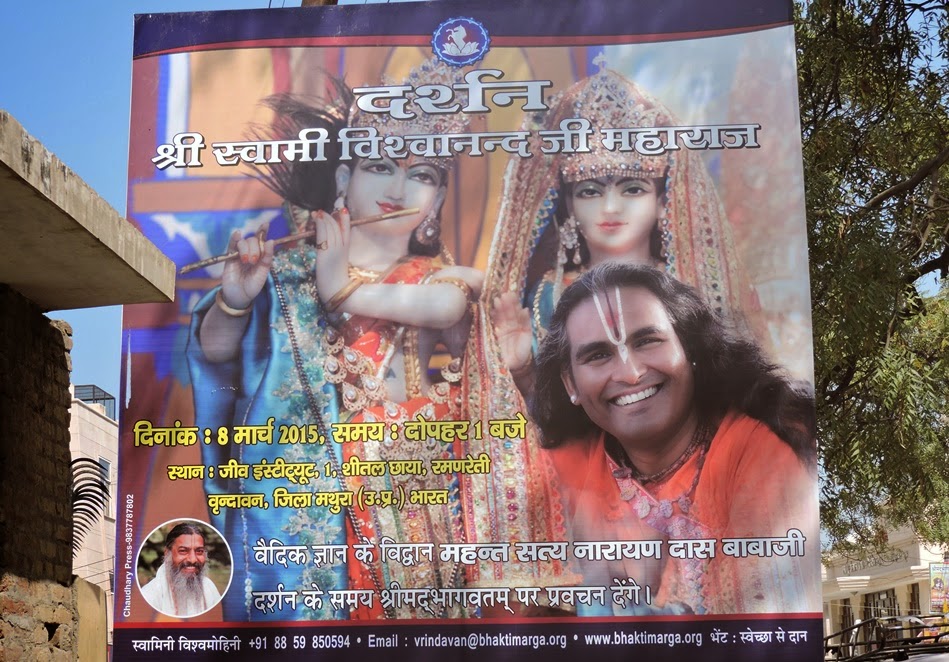Mutual Guruship: Vatsalya within Madhura
The guru-disciple relation is one of vātsalya. Vātsalya has a range of moods. Anyone situated in an advantageous position who wants to help another in a less advantageous position is experiencing vātsalya. This is a kind of love and of course has its levels, but its basis is compassion.
The definition of vātsalya comes from Rupa Goswami. Vātsalya means the love of a superior for an inferior, in whatever specific form. It takes the form of nourishment and protection. In this world, the highest vātsalya is that of the guru who gives his grace.
The number of rasas is limited to eight, or twelve, depending on the system you are following. Now where in this scheme does the sentiment of a guru to his disciple fit? And can one be a guru without vātsalya? It's like asking can you be a parent without vātsalya? Of course you can, but that parenthood without love would be rasābhāsa.
Vātsalya means that one in a position of superiority, out of love, helps one in a position of need arising from their lower position. In the case of the guru, it is the disparity of knowledge that defines the higher and lower status.
The teacher of mādhurya must himself be situated in mādhurya. Someone who gives instruction in love, let's say, instruction in Radha and Krishna madhura-rasa-bhakti, if he is doing it out of love, or compassion, is engaged in an act of vātsalya. This should not be seen as contradictory. It does not necessarily mean that there is a romantic or erotic relationship between the two. Nor should this vātsalya be seen as rasābhāsa.
If, however, this is a loving relationship of a couple, an erotic relationship, whether physical or not, i.e,. a madhura relationship, then vātsalya enters in the following form: "I love this person. But because of an anartha of some kind, or a misunderstanding of tattva, or of the process of sādhana, is damaging the purity of loving communion between us, i.e., the Dual. The "Dual" or Divine Couple is the object of our Yugala sādhana. Failure to attain that state is not only painful to me, but painful to my partner also. So let me find a way to stop the painful state we are both experiencing." That is vātsalya within madhura.
That is compassion, but because of the nature of madhura love, it appears to be kāma. But it is not. It is the vātsalya component within madhura. It is based in the desire to nurture and help the partner to blossom into a fully perfected being in love, as an individual, even at the cost of one's own satisfaction.
But because the one who is teaching also benefits, it appears to be kāma, and if one has no faith, the doubt that it is selfishly motivated will remain.
These are the exact kinds of things I would say to anyone who inquired into what it means that Radharani is Krishna's guru.
I would say, this one thing we are supposed to learn from their love: Mutual guruship.
This is a rather difficult concept. But the fact is that no sādhaka is perfect, by definition. And even if they were, they would be different enough to make any idea of completely melding into one another a hopeless task. Nevertheless, the idea that a man and woman help each other in a spirit of nurturing and protecting is the absolute correct truth.
In the Dual relationship, sometimes one partner is the leader, sometimes the other. Sometimes one partner is wrong sometimes the other. It is not always easy to recognize which because of impediments arising from the ego and so on. But because vātsalya is a component of mādhurya, just like a parent for a child, one lover will patiently and lovingly teach the other.
Why? Because it is for the common good of both, yes. But common good means for the partner also. If two lovers agree that their individual well being depends on the love of the other, then they are a Dual. If they have that agreement, tacit or sanctioned by vows, then they have a duty to help their partner advance spiritually, and that both advance further in love.
That may appear to be selfish because one is seeking corrections in the other, but it is not because the other is the primary beneficiary by receiving the teaching and progressing in love.
The definition of vātsalya comes from Rupa Goswami. Vātsalya means the love of a superior for an inferior, in whatever specific form. It takes the form of nourishment and protection. In this world, the highest vātsalya is that of the guru who gives his grace.
The number of rasas is limited to eight, or twelve, depending on the system you are following. Now where in this scheme does the sentiment of a guru to his disciple fit? And can one be a guru without vātsalya? It's like asking can you be a parent without vātsalya? Of course you can, but that parenthood without love would be rasābhāsa.
Vātsalya means that one in a position of superiority, out of love, helps one in a position of need arising from their lower position. In the case of the guru, it is the disparity of knowledge that defines the higher and lower status.
The teacher of mādhurya must himself be situated in mādhurya. Someone who gives instruction in love, let's say, instruction in Radha and Krishna madhura-rasa-bhakti, if he is doing it out of love, or compassion, is engaged in an act of vātsalya. This should not be seen as contradictory. It does not necessarily mean that there is a romantic or erotic relationship between the two. Nor should this vātsalya be seen as rasābhāsa.
If, however, this is a loving relationship of a couple, an erotic relationship, whether physical or not, i.e,. a madhura relationship, then vātsalya enters in the following form: "I love this person. But because of an anartha of some kind, or a misunderstanding of tattva, or of the process of sādhana, is damaging the purity of loving communion between us, i.e., the Dual. The "Dual" or Divine Couple is the object of our Yugala sādhana. Failure to attain that state is not only painful to me, but painful to my partner also. So let me find a way to stop the painful state we are both experiencing." That is vātsalya within madhura.
That is compassion, but because of the nature of madhura love, it appears to be kāma. But it is not. It is the vātsalya component within madhura. It is based in the desire to nurture and help the partner to blossom into a fully perfected being in love, as an individual, even at the cost of one's own satisfaction.
But because the one who is teaching also benefits, it appears to be kāma, and if one has no faith, the doubt that it is selfishly motivated will remain.
These are the exact kinds of things I would say to anyone who inquired into what it means that Radharani is Krishna's guru.
I would say, this one thing we are supposed to learn from their love: Mutual guruship.
This is a rather difficult concept. But the fact is that no sādhaka is perfect, by definition. And even if they were, they would be different enough to make any idea of completely melding into one another a hopeless task. Nevertheless, the idea that a man and woman help each other in a spirit of nurturing and protecting is the absolute correct truth.
In the Dual relationship, sometimes one partner is the leader, sometimes the other. Sometimes one partner is wrong sometimes the other. It is not always easy to recognize which because of impediments arising from the ego and so on. But because vātsalya is a component of mādhurya, just like a parent for a child, one lover will patiently and lovingly teach the other.
Why? Because it is for the common good of both, yes. But common good means for the partner also. If two lovers agree that their individual well being depends on the love of the other, then they are a Dual. If they have that agreement, tacit or sanctioned by vows, then they have a duty to help their partner advance spiritually, and that both advance further in love.
That may appear to be selfish because one is seeking corrections in the other, but it is not because the other is the primary beneficiary by receiving the teaching and progressing in love.



Comments